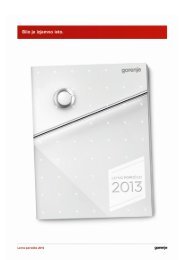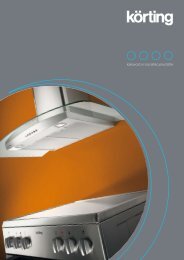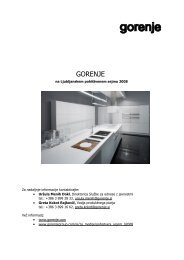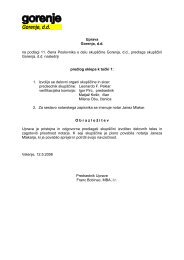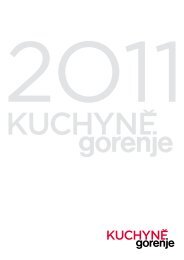ANNUAL REPORT 2008 - Gorenje Group
ANNUAL REPORT 2008 - Gorenje Group
ANNUAL REPORT 2008 - Gorenje Group
Create successful ePaper yourself
Turn your PDF publications into a flip-book with our unique Google optimized e-Paper software.
149<br />
bates. Revenue is recognised when the significant risks and rewards of ownership have been transferred<br />
to the buyer, recovery of the consideration is probable, the associated costs and possible return<br />
of goods can be estimated reliably, and there is no continuing management involvement with<br />
the goods, and when the revenue can be measured reliably.<br />
Transfers of risks and rewards vary depending on the individual terms of the contract of sale. For<br />
sales of goods, transfer usually occurs when the product is received at the customer’s warehouse;<br />
however, for some international shipments transfer occurs upon loading the goods onto the relevant<br />
carrier.<br />
(ii) Revenue from services<br />
Revenue from services rendered is recognised in profit or loss in proportion to the stage of completion<br />
of the transaction at the reporting date. The stage of completion is assessed by reference<br />
to surveys of work performed.<br />
(iii) Royalties (trademarks)<br />
Royalties are recognised in profit or loss in accordance with terms of the relevant agreement; the<br />
sale generated on individual geographical area is used as the basis.<br />
(iv) Rental income<br />
Rental income from investment property is recognised in profit or loss on a straight-line basis over<br />
the term of the lease. Lease incentives granted are recognised as an integral part of the total rental<br />
income, over the term of the lease.<br />
(m) Government grants<br />
All other types of government grants are recognised initially as deferred income when there is reasonable<br />
assurance that they will be received and that the Company will comply with the conditions<br />
associated with the grant. Grants that compensate the Company for expenses incurred are recognised<br />
in profit or loss on a systematic basis in the same periods in which the expenses are recognised.<br />
Grants that compensate the Company for the cost of an asset are recognised in profit or loss<br />
on a systematic basis over the useful life of the asset.<br />
(n) Finance income and expense<br />
Finance income comprises interest income on funds invested (including available-for-sale financial<br />
assets), dividend income, gains on the disposal of available-for-sale financial assets, and gains on<br />
hedging instruments that are recognised in profit or loss. Interest income is recognised as it accrues<br />
in profit or loss, using the effective interest method. Dividend income is recognised in profit or loss<br />
on the date that the Company’s right to receive payment is established, which in the case of quoted<br />
securities is the ex-dividend date.<br />
Finance expense comprises interest expense on borrowings, foreign exchange losses, impairment<br />
losses recognised on financial assets and trade receivables, and losses on hedging instruments that<br />
are recognised in profit or loss. All borrowing costs are recognised in profit or loss using the effective<br />
interest method.<br />
(o) Income tax<br />
Income tax expense comprises current and deferred tax. Income tax expense is recognised in<br />
profit or loss except to the extent that it relates to items recognised directly in equity, in which<br />
case it is recognised in equity.<br />
Current tax is the expected tax payable on the taxable income for the year, using tax rates enacted<br />
or substantively enacted at the reporting date, and any adjustment to tax payable in respect<br />
of previous years



